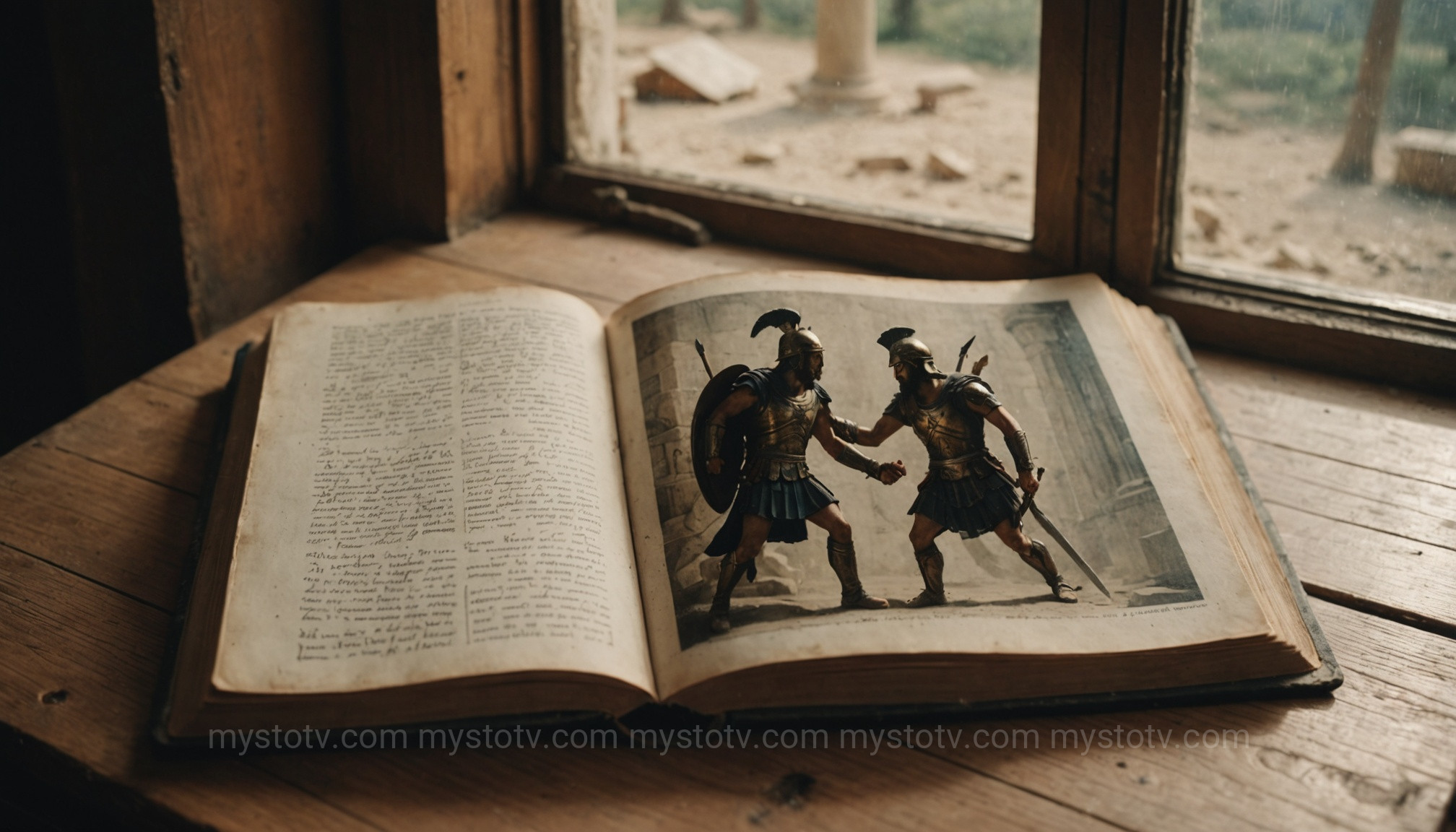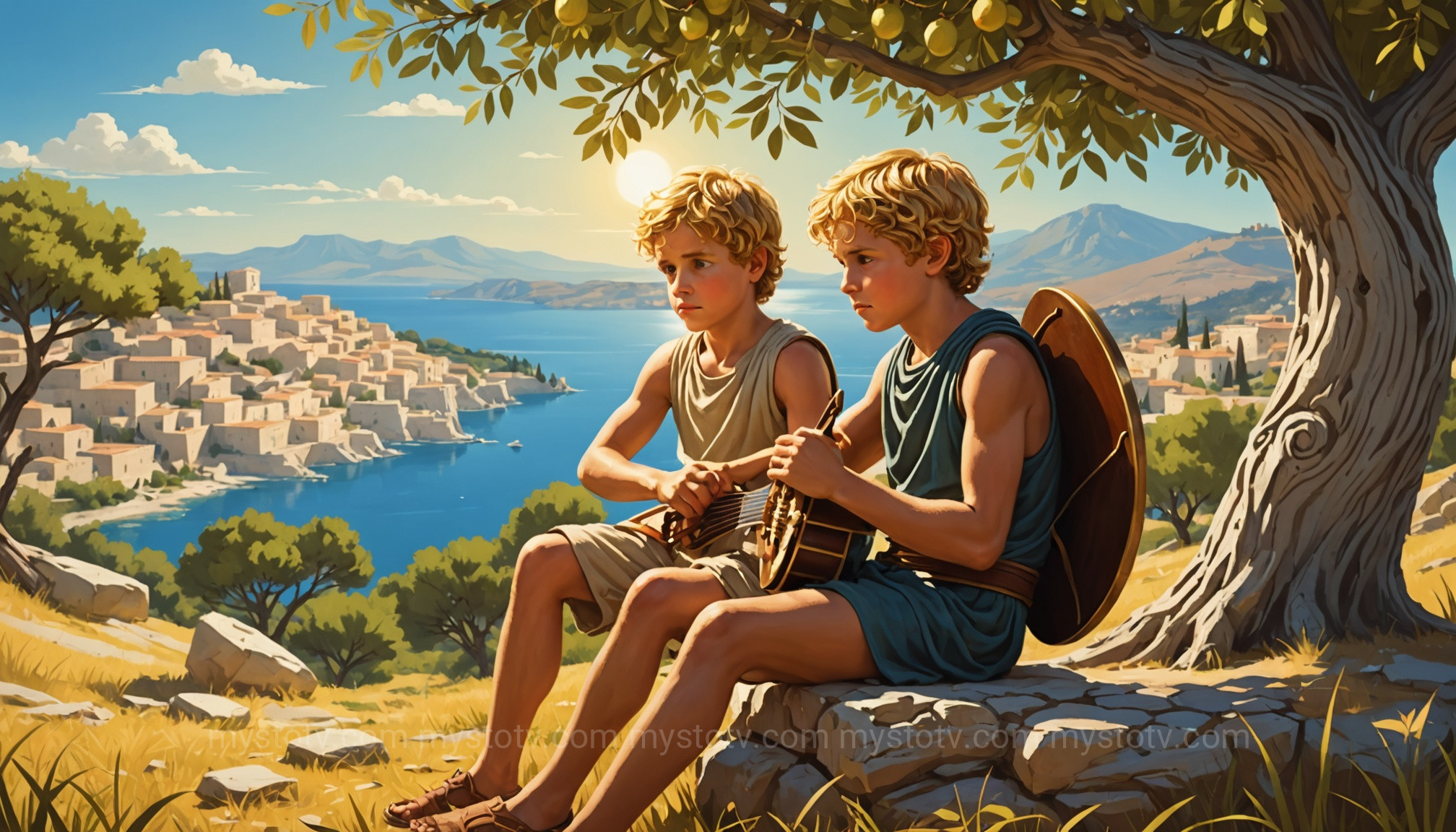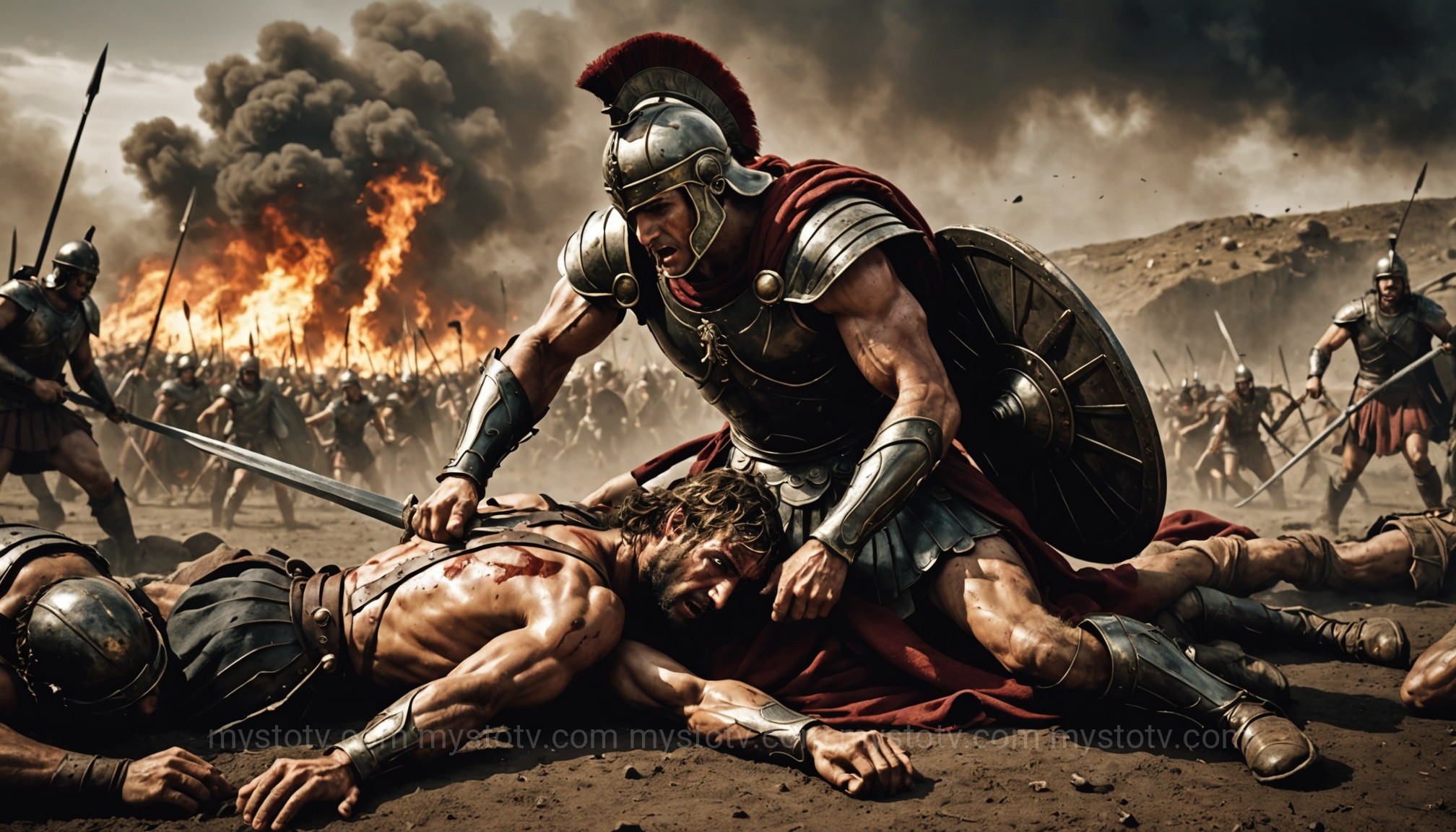I still remember the silence that fell over my room after I turned the final page of The Song of Achilles. It wasn't just the quiet of a finished book; it was a heavy, hollow feeling, the kind that only a truly profound story leaves behind. For days, the tragic romance lingered with me. I’d known the myth, of course—the great warrior Achilles and his companion Patroclus. But Madeline Miller’s novel didn’t just retell an old legend; it breathed life into it, transforming dusty names into living, breathing people whose love felt more real than the gods who sealed their fate. It reshaped my entire understanding of the achilles and patroclus story, turning an epic of war into an intimate, heartbreaking ballad of love and loss. This analysis delves into how Miller achieved that, exploring the layers that make this rendition so unforgettable.
Contents
- 1 Reimagining the Myth: How The Song of Achilles Presents the Achilles and Patroclus Story
- 2 The Formative Years: A Deep Dive into the Achilles and Patroclus Story Before Troy
- 3 Love and War: The Central Conflict in the Achilles and Patroclus Story
- 4 The Unraveling of a Legend: The Tragic Climax of the Achilles and Patroclus Story
- 5 The Enduring Legacy: Why the Achilles and Patroclus Story Resonates Today
- 6 FAQ on the Achilles and Patroclus Story
- 7 References
Reimagining the Myth: How The Song of Achilles Presents the Achilles and Patroclus Story

Madeline Miller’s The Song of Achilles is not merely a retelling of Homer's Iliad; it is a profound re-centering of it. While the Trojan War and the rage of Achilles remain the backdrop, the novel’s revolutionary act is placing the relationship between its two protagonists at the absolute core of the narrative. The classical sources, most notably The Iliad, leave the exact nature of their bond open to interpretation. Scholars have debated for centuries whether they were best friends, sworn brothers, or lovers. Miller removes this ambiguity entirely, presenting an unequivocal love story that begins in boyhood and ends in tragedy on the battlefields of Troy. This choice transforms the entire epic.
The novel’s most significant narrative decision is telling the entire achilles and patroclus story from the perspective of Patroclus. In The Iliad, Patroclus is a key but secondary character. Here, he is our narrator, our guide. We see Achilles not as the demigod, the "best of all the Greeks" (*Aristos Achaion*), but through the eyes of someone who loves him. We see his insecurities, his gentleness, his initial reluctance to embrace his violent destiny. This perspective shifts the story’s focus from glory (*kleos*) and war to love and humanity. The grand questions of fate and honor are filtered through the intimate lens of one man's devotion to another, making the epic personal and the tragedy deeply felt.
The Formative Years: A Deep Dive into the Achilles and Patroclus Story Before Troy

The foundation of Miller's heartbreaking narrative is built long before the ships sail for Troy. She devotes a significant portion of the novel to their youth, a period largely unexplored in classical myth. This focus is crucial because it establishes the depth and authenticity of their bond, making their later separation and loss all the more devastating. The achilles and patroclus story, in this version, is not born of war but of a shared, peaceful childhood.
From Awkward Meeting to Inseparable Souls
Their story begins with Patroclus, an awkward and unassuming prince, exiled to the court of Phthia after accidentally killing another boy. He is the antithesis of Achilles—the golden child, son of a king and a sea goddess, destined for greatness. Yet, it is Achilles who seeks out the quiet, ostracized Patroclus. This initial dynamic is critical. Achilles, surrounded by fawning admirers, chooses the one person who sees him as just a boy, not a future legend. Their connection forms in stolen moments: sharing figs, learning the lyre, and simply existing in each other's company. Miller masterfully shows their love growing organically from a place of mutual acceptance and quiet understanding, far from the expectations of gods and men.
Under the Tutelage of Chiron
Their time training with the centaur Chiron on Mount Pelion represents the apex of their idyllic youth. Here, away from the political machinations of the mortal world and the cold indifference of the gods, their love fully blossoms. Chiron teaches them not just the arts of war but also medicine, music, and philosophy. This period solidifies their roles: Achilles is the prodigy, excelling at everything, while Patroclus finds his calling in the gentler arts of healing. It is here that their relationship becomes physical, a natural and tender extension of their emotional intimacy. This section of the achilles and patroclus story is a sun-drenched sanctuary, a poignant "before" that contrasts sharply with the bloody "after" of the Trojan War. It is the world they will both long for and ultimately lose.
Love and War: The Central Conflict in the Achilles and Patroclus Story
The arrival of the call to war marks the end of their protected world and the beginning of the central conflict that defines the narrative. The Trojan War acts as a crucible, testing the love they forged in peace against the immense pressures of duty, honor, and a terrifying prophecy. The central tension in this part of the achilles and patroclus story is the constant battle between Achilles’s destiny as a warrior and his desire for a simple life with Patroclus.
The Prophecy and the Price of Glory
Achilles is given a choice by his goddess mother, Thetis: a long, unremarkable life of obscurity with Patroclus, or a short, glorious life at Troy that will ensure his name is remembered forever. Patroclus, naturally, wants the former. Achilles, burdened by the world's expectations and his own pride, is inexorably drawn to the latter. This dilemma is the engine of the plot. Patroclus’s presence at Troy is a constant, physical reminder of the life Achilles is sacrificing. Every moment of tenderness between them is shadowed by the knowledge that their time is finite. This struggle between personal love and the pursuit of public glory (*kleos*) elevates their story from a simple romance to a timeless tragedy about the human cost of ambition.
Briseis and the Shifting Dynamics
The introduction of Briseis, the captive Trojan woman whom Agamemnon seizes from Achilles, is the catalyst for the novel's climax. Miller portrays Briseis not just as a prize, but as a friend to Patroclus. Her presence complicates the camp's dynamics and highlights Patroclus's inherent compassion. When Agamemnon takes her, Achilles's rage is not just about wounded pride, as it is often framed in The Iliad. In The Song of Achilles, it is also a violation of the small, peaceful domesticity he and Patroclus had tried to carve out within their tent. Achilles’s subsequent withdrawal from the war is an act of defiance born of both hubris and a deep-seated rejection of a world that tramples on personal bonds. This conflict sets the stage for the ultimate tragedy of the achilles and patroclus story.
The Unraveling of a Legend: The Tragic Climax of the Achilles and Patroclus Story

The final act of The Song of Achilles is an emotional crescendo that fulfills the promise of heartbreak latent from the very first page. It is here that the delicate balance between love, pride, and fate shatters completely, leading to the devastating conclusion of the achilles and patroclus story. The narrative accelerates, mirroring the frantic and desperate decisions made by the characters.
The Fateful Decision
With the Greeks on the verge of annihilation and Achilles still refusing to fight, Patroclus makes a fateful choice. Driven by compassion for his suffering comrades and a desperate hope to shock Achilles out of his prideful stupor, he decides to wear Achilles’s armor and lead the Myrmidons into battle. This act is the ultimate expression of his character: he is not a warrior, but he is willing to become one to save others and, he hopes, to save Achilles from himself. Miller portrays this decision not as a moment of glory-seeking, but as an act of selfless love. Patroclus knows the risk, but his empathy outweighs his fear. He hopes to be a beacon of hope, but instead becomes a target.
The Death of Patroclus and Achilles's Grief
The description of Patroclus's death at the hands of Hector is brutal and unflinching. Told from his fading consciousness, it is disorienting and tragic. The true emotional weight, however, falls on what comes next: Achilles's reaction. His grief is not just sorrow; it is a cataclysmic force that transforms him from a sulking hero into a terrifying instrument of vengeance. The boy Patroclus loved is gone, replaced by a monster consumed by rage. Miller’s prose captures this transformation with chilling precision. Achilles's subsequent rampage, his desecration of Hector's body, and his own inevitable death are all presented as the direct, inescapable consequences of losing the person who was his "other half." His own end is not a hero's death but the final, hollow echo of Patroclus's.
The Enduring Legacy: Why the Achilles and Patroclus Story Resonates Today
The immense popularity of The Song of Achilles, more than a decade after its publication, speaks to its power to connect a 3,000-year-old myth with a contemporary audience. The novel's success lies in its exploration of universal themes through the specific, humanizing lens of a love story. Miller’s version of the achilles and patroclus story has become a cultural touchstone because it speaks to modern sensibilities about love, identity, and the true meaning of heroism.
One of the most significant reasons for its resonance is its unapologetic and tender portrayal of a queer relationship. By centering their love, the novel provides powerful representation within a foundational text of Western literature. It reclaims their narrative from centuries of heteronormative interpretations and presents their bond as something beautiful, valid, and worthy of an epic of its own. Readers connect with the authenticity of their emotions—the yearning, the jealousy, the quiet comfort—which feel timeless and universal, regardless of the mythological setting.
Furthermore, the novel challenges traditional notions of heroism. The "hero" of the story is not Achilles, the peerless warrior, but Patroclus, the compassionate healer. His heroism lies in his empathy, his kindness, and his ultimate sacrifice for love and for others. Achilles, in contrast, serves as a cautionary tale about how the pursuit of glory and pride can lead to ruin. In a world still grappling with the consequences of "toxic masculinity," this reframing of strength and honor is both refreshing and deeply relevant. This central conflict is explored earlier, showing how their values were destined to clash. The enduring legacy of this story is its powerful argument that the greatest epics are not always found on the battlefield, but in the quiet, profound connections between human hearts.
FAQ on the Achilles and Patroclus Story
1. Were Achilles and Patroclus lovers in the original Greek myths?
The original sources, like Homer's Iliad, do not explicitly state that they were lovers. However, the intensity of their bond is undeniable. Achilles's grief over Patroclus's death is more profound than any other emotion he displays. Later Greek authors, like Aeschylus and Plato, did interpret their relationship as a romantic one. Madeline Miller’s novel follows this interpretive tradition, choosing to make the romantic love explicit, which is a valid and historically supported reading of their connection.
2. What is the significance of Patroclus's name?
In the novel, Achilles is told that the name "Patroclus" means "glory of the father." He finds this ironic, given Patroclus’s strained relationship with his own father. However, the name takes on a new meaning throughout their lives. Patroclus becomes the source of Achilles’s humanity and, in a way, his true glory—not the glory of war, but the glory of love and compassion. His life defines Achilles far more than his father, Peleus, ever does.
3. Why is Thetis, Achilles's mother, so hostile towards Patroclus?
Thetis is a sea goddess, an immortal being who sees mortals as fleeting and insignificant. In her eyes, Patroclus is a distraction and a vulnerability for her son. She wants Achilles to embrace his divine, warrior-like nature and achieve immortal fame. Patroclus represents the opposite: mortality, love, peace, and a quiet life. She sees him as an anchor weighing her son down, preventing him from fulfilling the glorious destiny she has envisioned for him, making her a key antagonist in their personal story.
References
- Miller, Madeline. The Song of Achilles. Bloomsbury Publishing, 2011.
- Homer. The Iliad. Translated by Robert Fagles, Penguin Classics, 1990.
- Clarke, M. "The Erotics of the Iliad." Symbolae Osloenses, vol. 75, 2000, pp. 5-39.
In conclusion, Madeline Miller’s The Song of Achilles is a masterful work of literary alchemy. It takes the familiar scaffolding of myth and rebuilds it into a deeply personal and emotionally shattering monument to love. By shifting the perspective to Patroclus and centering his relationship with Achilles, she transforms the epic of the Trojan War into a timeless and tragic romance. The novel’s power lies in its ability to make us feel the weight of every choice, the warmth of every tender moment, and the crushing sorrow of the inevitable end. It ensures that when we think of the achilles and patroclus story, we remember not just a warrior and his companion, but a love so profound it could challenge fate, defy gods, and echo through eternity.